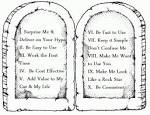Introduction: WHO: There has never been any doubt about the authorship of this biblical book. Obviously, it is the apostle Peter. He was the leader of the apostles. He was the one who walked on water, witnessed the mount of transfiguration, received a revelation that Jesus was the Christ, was reluctant to allow Jesus to wash his feet, and at his lowest point, denied knowing Christ.
But after the resurrection of Jesus and the coming of Holy Spirit, he was filled with power, preached on the day of Pentecost with 3000 being saved, stood up to the religious leaders, helped establish the church, and introduced the Gentiles to salvation. Eventually, he was crucified (upside down) for his faith.
WHEN and WHERE: According to Jewish tradition, Peter spent the last 10 years of his life in Rome. It is likely that he wrote this book while there, around 60-64 AD.
WHY: In his letters, Peter more fully explains the doctrines of Christianity while admonishing his readers to live holy lives. He also wrote to encourage his readers to stand firm in their faith, especially when facing persecution (5:12). This widespread persecution was probably incited by Nero, who blamed the Christians for burning Rome.
Peter addresses his audience as a pastor, who is warm, caring and encouraging to his flock. He provides practical instructions for how to live in the last days. As we might expect from a man born and raised as a Jew, he quotes and makes numerous references to the Old Testament, which we will see as we study this letter.
By the time this letter is penned, Peter is older and is a matured man of God. He will soon finish his earthly race, and we see in this epistle that is mind is focused on the ultimate destiny of all Christians – eternity in heaven with Christ.
I Peter 1:1 – Peter, an apostle of Jesus Christ, to those who are elect exiles of the Dispersion in Pontus, Galatia, Cappadocia, Asia and Bithynia...
Peter is an apostle - a messenger, or one who is sent forth. This is the highest office in the Christian church (I Corinthians 12:28). Peter was chosen for this office by Jesus himself (Matthew 10:2). He was given the keys to the kingdom of heaven (Matthew 16:19) and he was instrumental in establishing the church.
Because of the authority he carried as an apostle of Jesus Christ, the reader should take heed to the principles and spiritual truths revealed to them by this apostle.
Who exactly are those readers? Back in the day when Peter first wrote this letter, he was writing to Christians that were living away from Jerusalem, in the cities of Asia Minor. These Christians were a mixture of both Jews and Gentiles. So he is writing to an audience with a very diverse background – some had a familiarity with the law, while some came from a background of idol worship.
The Christians of that day were beginning to experience some great persecutions, especially since hatred of Christians was being endorsed by the Roman rulers (Nero and others).
But at the same time, his letters have very little information pertaining to local or temporary interest; almost nothing particular to that specific time or place. In fact, his writings have a universal application to all Christians of all ages. Let's see how it applies to us.
I Peter 1:2 - ...according to the foreknowledge of God the Father, in the sanctification of the Spirit, for obedience to Jesus Christ and for sprinkling with his blood: May grace and peace be multiplied to you.
While verse one gives us the external condition of these Christians (living in Asia Minor during an age of persecution), verse two gives us insight into their spiritual condition. They may have been oppressed and despised by the world, but they are held in high esteem by God.
These Christians (your version may refer to them as 'the elect'), have been sanctified by Holy Spirit. The terms 'elect' and 'sanctified' were titles borrowed from Jewish culture and law.
 One who is sanctified has been set apart from the rest of the world for the special purposes of God. Under the old law, all Jews were sanctified in the sense that their entire nation was set apart from the rest of the world, to bear the message of God to all people.
One who is sanctified has been set apart from the rest of the world for the special purposes of God. Under the old law, all Jews were sanctified in the sense that their entire nation was set apart from the rest of the world, to bear the message of God to all people.
Under the new covenant, Christians are individually sanctified. We have been called out of the world to be the light and salt of the earth. We are children of God, co-heirs with Jesus Christ, filled with the Spirit and part of the kingdom of heaven.
A lot is required of those who are sanctified. As we will see in this epistle, we are to put away the desires of our flesh and live lives of holiness and purity in our service to God.
We are also among the elect. To be elected means to be chosen. And here we must proceed with caution. Peter is not saying that God has chosen only certain people to be his children, while others have been excluded. Rather, based on his own plans and purposes, God offers eternal life to each and every person. Each of us must decide to accept or reject his offer.
John 3:16 – For God so loved the world, that he gave his only Son, that whoever believes in him should not perish but have eternal life.
God's plan/offer of eternal life through salvation was made 'according to foreknowledge'. Let's explain that. Strictly speaking, God has neither foreknowledge nor hind sight, because he is not locked into time as we are. All things are known to God in the present tense.
Consider it this way: Hold out your hand palm up. Draw a line in the palm of your hand. That line presents time. Just as you can see the beginning of that line and the end of that line at the same time, God can see all of time from the beginning to end, right now. To him, all of time is in the present tense. He holds time in his hand.
Foreknowledge, as used here, in I Peter 1:2, refers to the fact that before time began, God made a decision and formed a plan. He knew what he would do. Specifically, He fore-ordained the death and resurrection of Jesus who, through his blood, provided a way of escape from sin for all of mankind. Peter says it this way, in his speech on the day of Pentecost:
Act 2:23 – This Jesus, delivered up according to the definite plan and foreknowledge of God, you crucified and killed by the hands of lawless men.
So, just to be clear, 'foreknowledge' refers to the plans of God which he made before the beginning of time, knowing what would happen during time. 'Elect' refers to people who have chosen to accept the salvation that God offers to everyone.
Those who choose salvation are sanctified by the Spirit. So in this one verse from Peter, we find evidence of the Trinity – God the Father planned our salvation, God the Son reconciled us to the Father through his blood, and God the Spirit sanctifies and keeps us one with the Father.
[Side Note: Your eternal salvation rests on the foundation of the Trinity. I caution all of my readers to make sure that you do not destroy the foundation of your own safety by denying the deity, power and working of the Holy Spirit.]
Sanctification by the Spirit begins with the sprinkling of blood. This is one of those illusions to the law that was very well understood by all the Jewish converts (Exodus 24:8).
 Under the old law, being sprinkled with blood implied two things. One, something died. An innocent animal was sacrificed so that the blood could be sprinkled. Two, the application of that blood to themselves imputed benefits to them. Depending on the circumstances, the blood covered their sin, made them part of the covenant, set them apart for use by God and/or it cleansed them.
Under the old law, being sprinkled with blood implied two things. One, something died. An innocent animal was sacrificed so that the blood could be sprinkled. Two, the application of that blood to themselves imputed benefits to them. Depending on the circumstances, the blood covered their sin, made them part of the covenant, set them apart for use by God and/or it cleansed them.
However, Peter is writing to Christians who are under the new covenant. So in this case, the sprinkling of blood refers to the death and resurrection of Jesus, our innocent sacrifice, made once, for all of mankind. The benefits imputed to us by his shed blood are staggering. They include:
- Remission of sin (Romans 3:25, I John 1:7).
- Justification before God (Romans 5:9).
- Sealing of the covenant, as exemplified by communion (Luke 22:20).
- Admission to Heaven (Hebrews 10:19).
Once you have been sprinkled by the blood of the new covenant, Holy Spirit begins to reside in your heart and sanctifies you for obedience to Christ. His work of sanctification includes:
- Renewing our minds so that we understand truth (II Thessalonians 2:13).
- Assisting us in crucifying the flesh (Romans 8:13).
- Producing fruit in our lives (Galatians 5:22-23).
Sanctification by Holy Spirit could be described as a means to an end; through the renewing and purifying influences of the Spirit on our souls, we are able to yield ourselves up to obedience to Christ in all circumstances at all times.
I Peter 1:3 – Blessed be the God and Father of our Lord Jesus Christ! According to his great mercy, he has caused us to be born again to a living hope through the resurrection of Jesus Christ from the dead,
God offers salvation to us out of his great mercy. In other words, we have no right to salvation because of our own merits. Nothing we have done, or ever could do, would qualify us for this immeasurable blessing. In fact, God had every right to withhold mercy from us because of our sin.
But instead, he causes us to be 'born again'. Just as God is the author of our life in the natural sense, he is also the author of our second spiritual birth/life. This should always be a subject of gratitude and praise for the Christian. Never take this for granted. Just as God's mercy is new every day, so our praise of his benefits should arise fresh in our hearts and minds each day.
Our spiritual life is a living and powerful hope, producing joy, confidence, comfort and peace. It is the opposite of all that is cold, dead and ineffectual.
This hope rests upon the dual pillars of the death and resurrection of Christ. The resurrection was a confirmation of all that Jesus declared while on earth. The justification of our person, the regeneration of our nature, the resurrection of our bodies and our eternal glorification are all benefits given to us through the Spirit based on the resurrection of Christ. The power of the Spirit that raised Jesus to life (Romans 8:11), also produces life in us (Ephesians 1:17-23).
I Peter 1:4 – to an inheritance that is imperishable, undefiled and unfading, kept in heaven for you,
Let's talk about our inheritance. Christians are regarded as the adopted children of God, and heaven is part of our inheritance. It is given to us as proof of God's love for us.
Any inheritance we have in this world will vanish or be used up. But the inheritance of God is different. It is permanent – it will never be used up, taken away, lost or taxed! It is undefiled and pure – it was not obtained by fraud or dishonesty and it will not cause corruption to our souls (lust, greed, etc).
 We can enjoy our eternal inheritance while still being holy and active in the future service of God. These riches are appointed to us by our loving and generous Father, and he keeps them for the day when we join him in eternity.
We can enjoy our eternal inheritance while still being holy and active in the future service of God. These riches are appointed to us by our loving and generous Father, and he keeps them for the day when we join him in eternity.
I don't know about you, but to me, this is good news! The truths that Peter is revealing here must have been a very great source of comfort and joy to the Christians who were suffering back in his day.
They can and should also be a tremendous comfort to Christians today. At the present time you may be experiencing afflictions. We suffer physical ailments, broken relationships, financial hardships, persecution, unfairness and other forms of suffering. But this is not our eternal state. Peter will soon remind his readers that they are living in the last days, and at the end of time, heaven awaits us!
I Peter 1:5 – who by God's power are being guarded through faith for a salvation ready to be revealed in the last time.
The phrase 'being guarded' or 'kept' means to keep as in a garrison or fortress with a military watch, guarding against the approach of an enemy, both day and night. Peter informs us that God guards/keeps us for salvation.
Notice, that we are not guarded/kept from trials, problems, hard work or afflictions. On the contrary, Jesus informs us that in this world we will have tribulations (John 16:33). But take heart – these tribulations can only aggravate us in this world. Comfort, peace and all good things are promised to us in the coming age.
Our guarded condition consists of two parts.
The first part is God's almighty power. If we were to depend upon our own will, strength and resolution we would fall prey to any and every enemy (temptation). We could never keep ourselves safe from evil or expect to walk the paths of righteousness until we arrive in heaven. What a blessing to be guarded day and night by the mighty power of God!
The second part is our faith. God works in partnership with us. His power will not be exercised on our behalf unless we place our faith in him. As we steadily adhere to the Christian faith, we are guarded and protected by the mighty power of God; we are preserved unto salvation and eternal happiness which has already been prepared for us.
This salvation will be revealed in the last time. In other words, it is not a dream or a myth. It already exists; it has already been prepared for us. If we could see into the heavenly realm with mortal eyes, we would see it!
For now, we must be content to view it through our spiritual eyes. But rest assured - the fullness of our salvation will become evident at the end of this age, when it will be 'revealed', which implies a sudden unveiling. In a moment of time, God will raise the curtain and instantly display the inheritance which has been kept for us in heaven.
What do you think is waiting for you in the next life? Are you storing up treasures in heaven, or are you investing in this world?
I Peter 1:6 – In this you rejoice, though now for a little while, if necessary, you have been grieved by various trials,
The people who originally received this letter from Peter were suffering persecution for their faith. This may very well have resulted in loss of jobs/business, being social outcasts, inability to purchase goods/services/ land, exclusion from medical care, bodily harm, and other difficulties. This is the nature of trials. They tend to travel in groups, rather than singly and they obviously cause sorrow or grief.
Peter acknowledges their suffering, and offers them hope which would mitigate some of their sorrows.
First of all, Peter consoles them with the fact that their trials were only for a short season/little while. What did he mean by that statement?
He wasn't referring to the actual duration/time of their test. He had no way of knowing exactly how long the trials/persecutions of these Christians would last. Rather, he was comparing the difficulties of this life to an eternity with God. Paul expresses the same thoughts in his letter to the Corinthians:
II Corinthians 4:17 – For this light momentary affliction is preparing for us an eternal weight of glory beyond all comparison.
Paul and Peter are in agreement. Afflictions, even if they last a lifetime, should be considered momentary when compared to the eternal reward waiting for us in heaven.
Secondly, these afflictions come upon us only 'if necessary'. Peter gently suggests to suffering believers that although their trials may be grievous, they have a purpose. You may not see it at the moment, but Peter assures us that these trials are accomplishing eternal good in the life of the believer.
Think of it this way: There is a child of about 10-12 years old. The child does not realize it yet, but he is the heir to a vast empire. As such, he must be prepared for his coming responsibilities and privileges. He will be molded/made ready through experience and discipline.
The Christian can take heart in knowing that trials, afflictions and Godly discipline are a guarantee that our Father is preparing us for an unimaginably great and wonderful future. We can also be assured that he will never test us more than necessary.
One commentator has expressed this thought: 'When we have entered on our heavenly inheritance, our surprise will be that God has been enabled to accomplish in us such fitness for it through so few earthly trials'.
I Peter 1:7 – so that the tested genuineness of your faith – more precious than gold that perishes though it is tested by fire – may be found to result in praise and glory and honor at the revelation of Jesus Christ.
Here we find Peter making another analogy to the Old Testament, which his Jewish readers were sure to understand. The passage is found in Malachi, chapter 3.
Peter, like Malachi, compares the testing of the Christian faith to the refining of gold by fire.
Gold is one of the most precious metals. When subjected to extreme heat in a furnace, all of the impurities are burned away and the pure gold remains. It will be brighter, purer and more valuable than it was before.
 When God sends us into the fires of affliction, our faith is tested. All that is impure or unrighteous or false is burned away and our pure faith remains. This faith will be brighter, purer and more valuable than before. As an added bonus, we find that trials do more than just purify. They actually establish, improve and multiply the faith they test!
When God sends us into the fires of affliction, our faith is tested. All that is impure or unrighteous or false is burned away and our pure faith remains. This faith will be brighter, purer and more valuable than before. As an added bonus, we find that trials do more than just purify. They actually establish, improve and multiply the faith they test!
Through this testing of our faith, God prepares us to fulfill the destiny he has for us in the next realm of life with him.
Your faith is tested so that it may be 'found unto praise' or as our translation puts it, 'found to result in praise'. This means that our faith, which has been tested, will be found genuine and result in praise or commendation from our heavenly Father. We will hear him say 'Well done, good and faithful servant'! Tested faith also results in honor and glory. Honor is the respect or esteem of another. Thus, we will be respected or highly esteemed for our faith.
Jesus will soon appear and when he does, we will meet/appear with him and our graces will be seen. The more we have been tried in the fire, the more bright we will shine. Our earthly trials will soon be over, but the glory, honor and praise they produce in us will last for eternity!
I encourage you to dwell on these truths. They will certainly be a comfort to you, when enduring your trials.
I Peter 1:8 – Though you have not seen him, you love him. Though you do not now see him, you believe in him and rejoice with joy that is inexpressible and filled with glory,
Peter now commends the faith of his readers in several areas. The first is that they love Jesus, even though they never met him on earth.
Peter had indeed seen Jesus in the flesh as well as glorified on the mount of transfiguration. He understood at least part of the glory, wisdom and power of God, because he had witnessed it with his physical eyes.
His readers, however, did not have that benefit.
II Corinthians 5:7 – ...we walk by faith, not by sight.
They saw Jesus through eyes of faith, believing on him through the preaching of the gospel message (John 20:29).
Is simple belief enough? Certainly not! Even the demons believe in Jesus and tremble (James 2:19). The Christians that Peter is addressing not only believe in Jesus but their belief has brought forth fruit - it resulted in obedience and subjection to Christ, reliance on his power and an expectation of fulfillment of all his promises.
 You and I are in much the same situation. Although we have not seen Jesus with our physical eyes, we (and untold millions of others) believed in him through the preaching of the gospel message. Our faith in him has resulted in our obedience to his word and will. It has resulted in our reliance on his power. It has resulted in a strong faith that expects fulfillment of all the good promises that God has made to us.
You and I are in much the same situation. Although we have not seen Jesus with our physical eyes, we (and untold millions of others) believed in him through the preaching of the gospel message. Our faith in him has resulted in our obedience to his word and will. It has resulted in our reliance on his power. It has resulted in a strong faith that expects fulfillment of all the good promises that God has made to us.
This kind of a relationship with Jesus results in inexpressible joy and glory. Think back to the time when you first gave your life to Jesus. Didn't you feel an incredible joy and peace when the burden of sin was removed from you? Now that you are a more mature believer with many trials under your belt, can't you still say that joy and happiness are yours through Jesus Christ your Lord? Can't you truthfully say that true joy comes from your relationship with Him, rather than your outward circumstances?
A relationship with Jesus can offer what is solid, real and permanent which will never disappoint or fade away. Even though we don't see it today we have the assurance that it will one day be ours. AMEN!
I Peter 1:9 – obtaining the outcome of your faith, the salvation of your souls.
The ultimate end, the consummation, the reward of the Christian's faith is the salvation of our soul (and our body). We can be sure, even now, that we will most certainly receive the salvation promised to us by Christ. Here then, is even greater reason for inexpressible joy!
Let me offer you some encouragement:
I know we have heard this before, but the words are not idly spoken – the trials you now face have an eternal purpose.
Take a second look at the point we made back in our study of Malachi: God will refine us – he will purge us through instruction, affliction, temptation or any other way that Holy Spirit sees fit, in order to rid us of the grime of sin and make us pure and holy, fit for his service. This is not a punishment. It is a growing process that will be for the glory of God and our good.
Let me offer you some relief:
Trials do not last forever! When their purpose is complete, God will remove them from your life.
Let me offer you some strength:
God has a close watch on your afflictions and trials. As we said in our study of Malachi, God is the craftsman, sitting by the fires of trials and tribulations, with his people in the crucible of life. He perfectly and skillfully places them into situations that are not too hot (difficult), nor too cold (easy). He keeps his people in the fire for the exact amount of time needed to burn up their sin and unholiness, then immediately and tenderly removes them to safety, so nothing is lost. The result is a people fit for service in his kingdom; a people who will rule and reign with him in the next age.
So be strong in the midst of your trials – they are working out your eternal glory!

